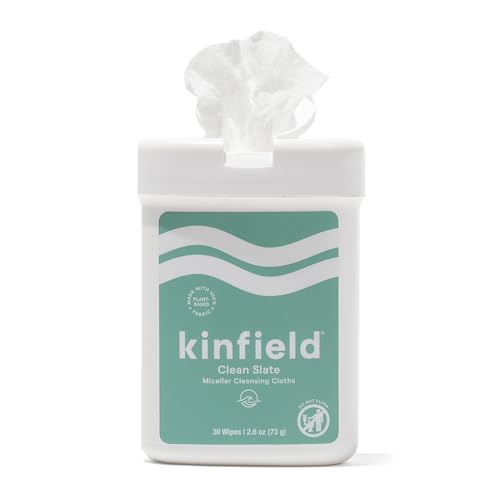
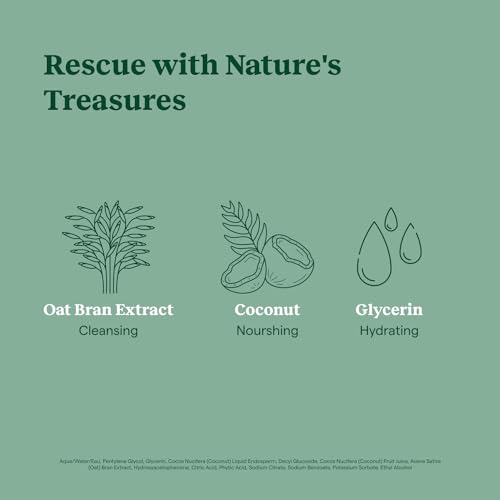
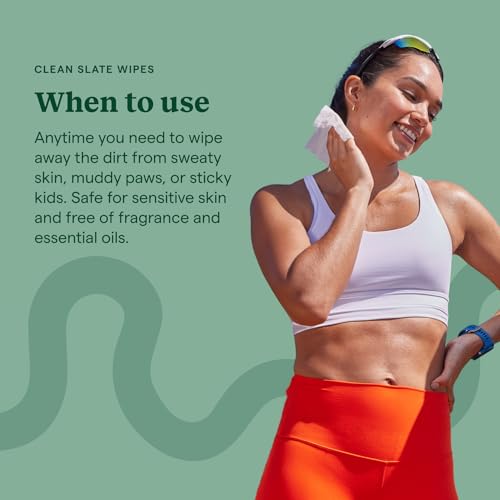
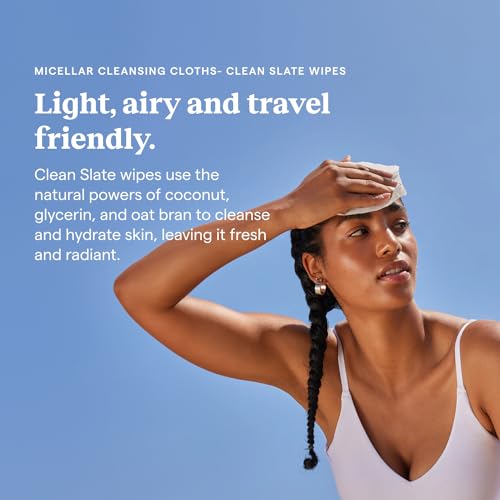
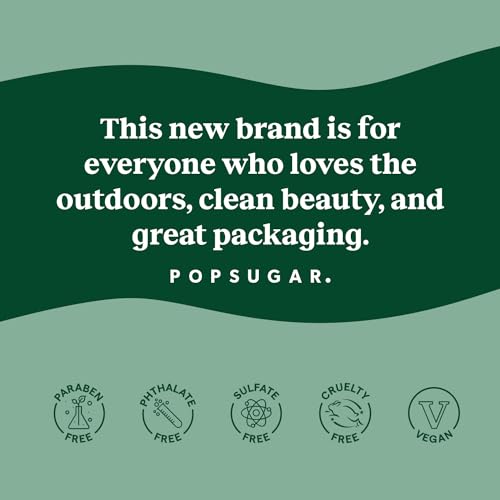
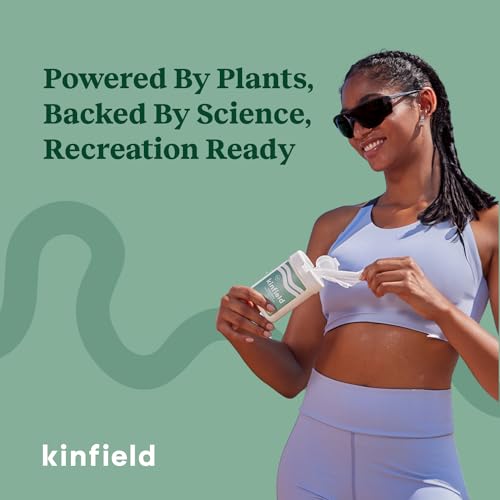
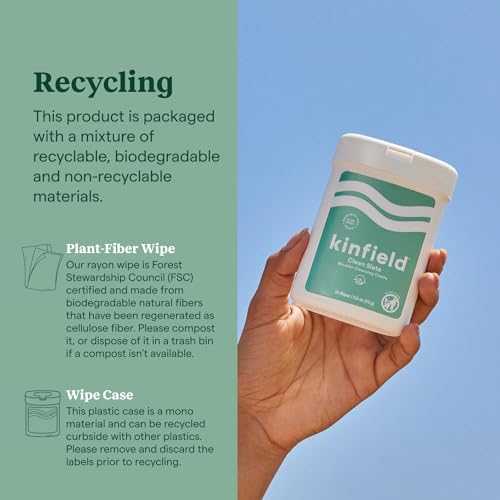
Kinfield Clean Slate Micellar Cleansing Cloths - Gentle, Plant-Based, Vegan - 30 Wipes


Citric Acid
Medium RiskCitric acid is an alpha hydroxy acid used in personal care products primarily for its role as a pH adjuster and natural preservative. It occurs naturally in citrus fruits and is commonly utilized in various formulations for its chelating properties and mild exfoliation benefits.
Sustai Insights
Citric acid offers functional benefits as an effective preservative and pH stabilizer, contributing to product longevity and stability. It is biodegradable and derived from renewable sources. Health risks are low, with minimal concerns regarding carcinogenicity, allergies, and reproductive toxicity. However, moderate use restrictions exist due to potential irritation at high concentrations. Environmental risks are limited, as citric acid is not known to accumulate in ecosystems. Regulatory agencies have no significant advisories against its use. Overall, it is assessed as a medium-risk ingredient, with safe usage practices recommended and alternatives available.
Potassium Sorbate
Medium RiskPotassium sorbate is a potassium salt of sorbic acid, primarily used as a preservative in food and cosmetic products. It inhibits the growth of molds, yeast, and some bacteria, extending the shelf life of products. It is commonly found in various formulations due to its effectiveness and low toxicity.
Sustai Insights
Potassium sorbate serves as an effective preservative, preventing microbial growth in food and cosmetic products, which is vital for safety and longevity. Although it has a low risk of carcinogenicity and developmental toxicity, there is a moderate concern regarding allergies and immunotoxicity. Environmentally, it poses minimal risks as it is not significantly bioaccumulative. Regulatory agencies have verified its use, although some products may face restrictions. Overall, it is assessed as a medium risk ingredient, with safe usage practices recommended, and alternatives such as natural preservatives could be considered.
Sodium Benzoate
Medium RiskSodium benzoate is a preservative commonly used in food and cosmetic products to prevent microbial growth and extend shelf life. It is derived from benzoic acid and is effective at low concentrations, often used in acidic environments like beverages and condiments.
Sustai Insights
Sodium benzoate serves effectively as a preservative, contributing to product stability and safety. It is generally recognized as safe with low concerns for carcinogenicity, allergies, and reproductive toxicity, though it faces moderate use restrictions in some regions. Environmental risks include its potential as a pollutant, but it does not bioaccumulate significantly. Regulatory bodies have issued advisories regarding its concentration in products. Overall, the risk level is assessed as medium, with safe usage practices recommended. Alternatives such as potassium sorbate may provide similar benefits with potentially lower restrictions.
Water
Low RiskWater is a clear, colorless liquid essential for various biological processes. It serves as a solvent in formulations, facilitating the dissolution of other ingredients and enhancing product texture and application. Additionally, water plays a crucial role in hydration and is a key component in many cosmetic and personal care products.
Sustai Insights
Water is an effective solvent and hydrator, contributing to the texture and efficacy of formulations. It is biodegradable and generally regarded as safe, with low concerns regarding carcinogenicity, allergies, and reproductive toxicity. However, excessive water usage can lead to environmental concerns, particularly regarding resource depletion. Regulatory bodies do not impose restrictions on water use in cosmetics. Overall, the risks associated with water are low, making it a safe and essential ingredient.
Vegetarian Glycerin
Low RiskVegetarian glycerin, also known as glycerol, is a colorless, odorless, and viscous liquid derived from plant sources. It is primarily used as a humectant, solvent, and emollient in various personal care products, helping to retain moisture and improve texture.
Sustai Insights
Vegetarian glycerin offers functional benefits as an effective humectant, promoting hydration and skin smoothness. It is biodegradable and typically sustainably sourced. Health risks associated with glycerin are low, with no significant concerns for carcinogenicity, allergens, or reproductive toxicity. Environmental risks are minimal, and it is not subject to major regulatory warnings. Overall, the risk level for this ingredient is low, making it a safe choice in formulations. Safe usage practices include ensuring proper concentrations in products, and alternatives such as propylene glycol exist but may have differing properties.
Pentylene Glycol
Low RiskPentylene glycol is a synthetic, low molecular weight glycol that functions primarily as a humectant, solvent, and skin-conditioning agent in cosmetic formulations. It is commonly used to enhance product texture and moisture retention.
Sustai Insights
Pentylene glycol offers functional benefits as a humectant, effectively attracting moisture to the skin. It is generally considered to have low health risks, with minimal concerns regarding carcinogenicity, allergies, or developmental toxicity. However, it may cause mild skin, eye, or lung irritation in sensitive individuals. Environmentally, it poses low risk as it is not bioaccumulative or a significant pollutant. Regulatory bodies have not imposed restrictions on its use. Overall, it presents a low risk profile, making it a safe choice in cosmetic formulations, with no significant adverse effects reported.
Avena Sativa (Oat) Bran Extract
Low RiskAvena sativa (oat) bran extract is an extract derived from the outer layer of oat grains. It is commonly used in cosmetic formulations for its potential skin-soothing properties, as well as its ability to provide moisture and improve skin texture.
Sustai Insights
Avena sativa (oat) bran extract offers functional benefits such as moisturizing and soothing properties, making it valuable in skincare products. It is sustainably sourced and generally recognized as safe, with low concerns for carcinogenicity, allergies, and reproductive toxicity. Environmental risks are minimal, with no significant pollutant or bioaccumulation potential. Regulatory bodies do not impose major restrictions on its use. Overall, the ingredient poses low health and environmental risks, making it a suitable choice in cosmetic formulations.
Phytic Acid
Low RiskPhytic acid is a hexaphosphoric acid ester of inositol, primarily found in seeds, grains, and legumes. It acts as an antioxidant and is often used in cosmetic formulations for its chelating properties, helping to stabilize products by binding metal ions.
Sustai Insights
Phytic acid provides functional benefits such as antioxidant properties and metal ion chelation, enhancing product stability. It is considered environmentally friendly due to its biodegradable nature. Health risks are low, with minimal concerns regarding carcinogenicity, allergies, or reproductive toxicity. Regulatory bodies have imposed minor restrictions, and overall, the risk level is assessed as low. For safe usage, it is important to follow recommended concentrations. Alternatives like ascorbic acid could be considered for similar antioxidant effects.
Decyl Glucoside
Low RiskDecyl glucoside is a glucose-based surfactant derived from natural sources, primarily used as a mild cleansing agent in personal care products. It effectively reduces surface tension, allowing for improved mixing of ingredients and enhanced cleansing properties without stripping natural oils from the skin.
Sustai Insights
Decyl glucoside offers functional benefits as a non-ionic surfactant, making it suitable for sensitive skin formulations. It is biodegradable and derived from renewable resources, supporting sustainability. Health risks are primarily low, with minimal concerns regarding irritation and allergies. Environmental risks are low, as it does not significantly contribute to pollution or bioaccumulation. Regulatory status is generally favorable, with low restrictions noted. Overall, decyl glucoside presents a low risk for use in consumer products, making it a suitable choice for gentle formulations.
Cocos Nucifera (Coconut) Fruit Juice
Low RiskCocos Nucifera (Coconut) Fruit Juice is a liquid derived from the fruit of the coconut palm, widely used in cosmetic formulations for its moisturizing and soothing properties. It serves as a natural humectant, helping to maintain skin hydration and improve texture in various personal care products.
Sustai Insights
Cocos Nucifera (Coconut) Fruit Juice offers functional benefits such as hydration and skin soothing, making it a beneficial ingredient in cosmetics. It is sustainably sourced and biodegradable, contributing positively to environmental considerations. Health risks are low, with no significant concerns regarding carcinogenicity, allergens, or reproductive toxicity. Regulatory bodies impose few restrictions, and overall risk is assessed as low. Safe usage promotes skin health without notable adverse effects. Alternatives include other fruit juices or plant extracts that offer similar moisturizing properties.
Hydroxyacetophenone
Low RiskHydroxyacetophenone is an organic compound commonly used in cosmetic and personal care products. It serves primarily as a skin-conditioning agent and antioxidant, contributing to product stability and performance without imparting subjective effects.
Sustai Insights
Hydroxyacetophenone is valued for its functional benefits, including antioxidant properties that help stabilize formulations. It poses low health risks, with minimal concerns regarding carcinogenicity, allergies, and reproductive toxicity. Environmental impact is also low, with no significant pollutant or bioaccumulation concerns noted. Regulatory assessments do not indicate any restrictions. Safe usage practices should be followed, and while alternatives exist, hydroxyacetophenone is deemed a low-risk ingredient overall.
Sodium Citrate
Low RiskSodium citrate is used in cosmetic formulations primarily as a buffering agent, helping to stabilize pH levels. It is derived from citric acid and is commonly found in various personal care products to enhance their efficacy and stability.
Sustai Insights
Sodium citrate offers functional benefits such as effective pH regulation and acts as a mild preservative. It is generally recognized as safe with low risks for cancer, allergies, and reproductive toxicity. Environmental concerns are minimal, with no significant pollutant potential or bioaccumulation. Regulatory bodies like the FDA and COSMOS have no major restrictions on its use. Overall, sodium citrate presents a low risk, making it a viable ingredient in cosmetic formulations. Safe usage practices should be followed, and alternatives are not typically necessary.
Water
Low RiskWater is a clear, colorless liquid essential for various biological processes. It serves as a solvent in formulations, facilitating the dissolution of other ingredients and enhancing product texture and application. Additionally, water plays a crucial role in hydration and is a key component in many cosmetic and personal care products.
Sustai Insights
Water is an effective solvent and hydrator, contributing to the texture and efficacy of formulations. It is biodegradable and generally regarded as safe, with low concerns regarding carcinogenicity, allergies, and reproductive toxicity. However, excessive water usage can lead to environmental concerns, particularly regarding resource depletion. Regulatory bodies do not impose restrictions on water use in cosmetics. Overall, the risks associated with water are low, making it a safe and essential ingredient.
Vegetarian Glycerin
Low RiskVegetarian glycerin, also known as glycerol, is a colorless, odorless, and viscous liquid derived from plant sources. It is primarily used as a humectant, solvent, and emollient in various personal care products, helping to retain moisture and improve texture.
Sustai Insights
Vegetarian glycerin offers functional benefits as an effective humectant, promoting hydration and skin smoothness. It is biodegradable and typically sustainably sourced. Health risks associated with glycerin are low, with no significant concerns for carcinogenicity, allergens, or reproductive toxicity. Environmental risks are minimal, and it is not subject to major regulatory warnings. Overall, the risk level for this ingredient is low, making it a safe choice in formulations. Safe usage practices include ensuring proper concentrations in products, and alternatives such as propylene glycol exist but may have differing properties.
Citric Acid
Medium RiskCitric acid is an alpha hydroxy acid used in personal care products primarily for its role as a pH adjuster and natural preservative. It occurs naturally in citrus fruits and is commonly utilized in various formulations for its chelating properties and mild exfoliation benefits.
Sustai Insights
Citric acid offers functional benefits as an effective preservative and pH stabilizer, contributing to product longevity and stability. It is biodegradable and derived from renewable sources. Health risks are low, with minimal concerns regarding carcinogenicity, allergies, and reproductive toxicity. However, moderate use restrictions exist due to potential irritation at high concentrations. Environmental risks are limited, as citric acid is not known to accumulate in ecosystems. Regulatory agencies have no significant advisories against its use. Overall, it is assessed as a medium-risk ingredient, with safe usage practices recommended and alternatives available.
Pentylene Glycol
Low RiskPentylene glycol is a synthetic, low molecular weight glycol that functions primarily as a humectant, solvent, and skin-conditioning agent in cosmetic formulations. It is commonly used to enhance product texture and moisture retention.
Sustai Insights
Pentylene glycol offers functional benefits as a humectant, effectively attracting moisture to the skin. It is generally considered to have low health risks, with minimal concerns regarding carcinogenicity, allergies, or developmental toxicity. However, it may cause mild skin, eye, or lung irritation in sensitive individuals. Environmentally, it poses low risk as it is not bioaccumulative or a significant pollutant. Regulatory bodies have not imposed restrictions on its use. Overall, it presents a low risk profile, making it a safe choice in cosmetic formulations, with no significant adverse effects reported.
Avena Sativa (Oat) Bran Extract
Low RiskAvena sativa (oat) bran extract is an extract derived from the outer layer of oat grains. It is commonly used in cosmetic formulations for its potential skin-soothing properties, as well as its ability to provide moisture and improve skin texture.
Sustai Insights
Avena sativa (oat) bran extract offers functional benefits such as moisturizing and soothing properties, making it valuable in skincare products. It is sustainably sourced and generally recognized as safe, with low concerns for carcinogenicity, allergies, and reproductive toxicity. Environmental risks are minimal, with no significant pollutant or bioaccumulation potential. Regulatory bodies do not impose major restrictions on its use. Overall, the ingredient poses low health and environmental risks, making it a suitable choice in cosmetic formulations.
Phytic Acid
Low RiskPhytic acid is a hexaphosphoric acid ester of inositol, primarily found in seeds, grains, and legumes. It acts as an antioxidant and is often used in cosmetic formulations for its chelating properties, helping to stabilize products by binding metal ions.
Sustai Insights
Phytic acid provides functional benefits such as antioxidant properties and metal ion chelation, enhancing product stability. It is considered environmentally friendly due to its biodegradable nature. Health risks are low, with minimal concerns regarding carcinogenicity, allergies, or reproductive toxicity. Regulatory bodies have imposed minor restrictions, and overall, the risk level is assessed as low. For safe usage, it is important to follow recommended concentrations. Alternatives like ascorbic acid could be considered for similar antioxidant effects.
Decyl Glucoside
Low RiskDecyl glucoside is a glucose-based surfactant derived from natural sources, primarily used as a mild cleansing agent in personal care products. It effectively reduces surface tension, allowing for improved mixing of ingredients and enhanced cleansing properties without stripping natural oils from the skin.
Sustai Insights
Decyl glucoside offers functional benefits as a non-ionic surfactant, making it suitable for sensitive skin formulations. It is biodegradable and derived from renewable resources, supporting sustainability. Health risks are primarily low, with minimal concerns regarding irritation and allergies. Environmental risks are low, as it does not significantly contribute to pollution or bioaccumulation. Regulatory status is generally favorable, with low restrictions noted. Overall, decyl glucoside presents a low risk for use in consumer products, making it a suitable choice for gentle formulations.
Cocos Nucifera (Coconut) Fruit Juice
Low RiskCocos Nucifera (Coconut) Fruit Juice is a liquid derived from the fruit of the coconut palm, widely used in cosmetic formulations for its moisturizing and soothing properties. It serves as a natural humectant, helping to maintain skin hydration and improve texture in various personal care products.
Sustai Insights
Cocos Nucifera (Coconut) Fruit Juice offers functional benefits such as hydration and skin soothing, making it a beneficial ingredient in cosmetics. It is sustainably sourced and biodegradable, contributing positively to environmental considerations. Health risks are low, with no significant concerns regarding carcinogenicity, allergens, or reproductive toxicity. Regulatory bodies impose few restrictions, and overall risk is assessed as low. Safe usage promotes skin health without notable adverse effects. Alternatives include other fruit juices or plant extracts that offer similar moisturizing properties.
Hydroxyacetophenone
Low RiskHydroxyacetophenone is an organic compound commonly used in cosmetic and personal care products. It serves primarily as a skin-conditioning agent and antioxidant, contributing to product stability and performance without imparting subjective effects.
Sustai Insights
Hydroxyacetophenone is valued for its functional benefits, including antioxidant properties that help stabilize formulations. It poses low health risks, with minimal concerns regarding carcinogenicity, allergies, and reproductive toxicity. Environmental impact is also low, with no significant pollutant or bioaccumulation concerns noted. Regulatory assessments do not indicate any restrictions. Safe usage practices should be followed, and while alternatives exist, hydroxyacetophenone is deemed a low-risk ingredient overall.
Sodium Citrate
Low RiskSodium citrate is used in cosmetic formulations primarily as a buffering agent, helping to stabilize pH levels. It is derived from citric acid and is commonly found in various personal care products to enhance their efficacy and stability.
Sustai Insights
Sodium citrate offers functional benefits such as effective pH regulation and acts as a mild preservative. It is generally recognized as safe with low risks for cancer, allergies, and reproductive toxicity. Environmental concerns are minimal, with no significant pollutant potential or bioaccumulation. Regulatory bodies like the FDA and COSMOS have no major restrictions on its use. Overall, sodium citrate presents a low risk, making it a viable ingredient in cosmetic formulations. Safe usage practices should be followed, and alternatives are not typically necessary.
Potassium Sorbate
Medium RiskPotassium sorbate is a potassium salt of sorbic acid, primarily used as a preservative in food and cosmetic products. It inhibits the growth of molds, yeast, and some bacteria, extending the shelf life of products. It is commonly found in various formulations due to its effectiveness and low toxicity.
Sustai Insights
Potassium sorbate serves as an effective preservative, preventing microbial growth in food and cosmetic products, which is vital for safety and longevity. Although it has a low risk of carcinogenicity and developmental toxicity, there is a moderate concern regarding allergies and immunotoxicity. Environmentally, it poses minimal risks as it is not significantly bioaccumulative. Regulatory agencies have verified its use, although some products may face restrictions. Overall, it is assessed as a medium risk ingredient, with safe usage practices recommended, and alternatives such as natural preservatives could be considered.
Sodium Benzoate
Medium RiskSodium benzoate is a preservative commonly used in food and cosmetic products to prevent microbial growth and extend shelf life. It is derived from benzoic acid and is effective at low concentrations, often used in acidic environments like beverages and condiments.
Sustai Insights
Sodium benzoate serves effectively as a preservative, contributing to product stability and safety. It is generally recognized as safe with low concerns for carcinogenicity, allergies, and reproductive toxicity, though it faces moderate use restrictions in some regions. Environmental risks include its potential as a pollutant, but it does not bioaccumulate significantly. Regulatory bodies have issued advisories regarding its concentration in products. Overall, the risk level is assessed as medium, with safe usage practices recommended. Alternatives such as potassium sorbate may provide similar benefits with potentially lower restrictions.
Discover the Kinfield Clean Slate Micellar Cleansing Cloths, your eco-friendly solution for freshening up on the go! These biodegradable wipes are perfect for sensitive skin, offering a gentle yet effective clean without harsh chemicals.
- Eco-Friendly Versatility: Ideal for outdoor enthusiasts, these wipes effortlessly tackle makeup, sweat, or muddy paws, making them perfect for daily adventures.
- Gentle Effectiveness: Infused with oat bran and coconut, these vegan wipes cleanse without irritation, ensuring a refreshing experience for even the most sensitive skin.
- Convenient for Active Lives: Compact and travel-friendly, these wipes are great for a post-workout refresh or quick cosmetic removal anytime, anywhere.
- Unscented for All: Formulated with everyone in mind, including kids and pets, these unscented wipes provide soothing care without any harsh fragrances.
- Sustainable Skin Care: Committed to the planet, our wipes come in recyclable packaging, reflecting a dedication to environmental stewardship and sustainability.
Subscribe & Save with Sustai
- Best Price Guarantee: Always enjoy the lowest prices on sustainable home essentials.
- No Surprises: We’ll notify you before shipping. No hidden fees, ever.
- You’re in Charge: Change, pause, or cancel your subscription anytime with ease.
- Eco-Friendly Deliveries: Our grouped shipments mean less packaging and lower emissions.
Join us on a sustainable journey. Special offers for a limited time! Prices and promotions may change.
Recommended Products
Discover the Kinfield Clean Slate Micellar Cleansing Cloths, your eco-friendly solution for freshening up on the go! These biodegradable wipes are perfect for sensitive skin, offering a gentle yet effective clean without harsh chemicals.
- Eco-Friendly Versatility: Ideal for outdoor enthusiasts, these wipes effortlessly tackle makeup, sweat, or muddy paws, making them perfect for daily adventures.
- Gentle Effectiveness: Infused with oat bran and coconut, these vegan wipes cleanse without irritation, ensuring a refreshing experience for even the most sensitive skin.
- Convenient for Active Lives: Compact and travel-friendly, these wipes are great for a post-workout refresh or quick cosmetic removal anytime, anywhere.
- Unscented for All: Formulated with everyone in mind, including kids and pets, these unscented wipes provide soothing care without any harsh fragrances.
- Sustainable Skin Care: Committed to the planet, our wipes come in recyclable packaging, reflecting a dedication to environmental stewardship and sustainability.

You can have at most 2 Sustainable Steals products in your cart
Customer Reviews
Customers’ View
Customers generally appreciate the gentle and effective cleansing properties of Kinfield's Plant-Based, Biodegradable Cleansing Wipes, particularly for sensitive skin. Many users find them convenient for on-the-go use, noting their compact packaging is ideal for travel and gym bags. One customer highlighted that the wipes leave the skin feeling refreshed and clean without added fragrances, making them suitable for both adults and pets. While some mentioned the wipes are smaller and less moist than other options, they still serve well for quick clean-ups after workouts or outdoor activities. Additionally, the biodegradable nature of the product aligns well with eco-conscious values, making it a favorable choice for environmentally aware consumers. Overall, users recognize the product's effectiveness and appreciate its commitment to sustainability.
AI-generated from the text of customer reviewsThis product is rated 4.2 of 5.0 stars.
It has received 17 reviews.




